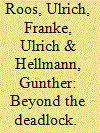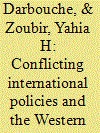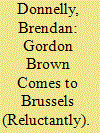|
|
|
Sort Order |
|
|
|
Items / Page
|
|
|
|
|
|
|
| Srl | Item |
| 1 |
ID:
080952


|
|
|
|
|
| Publication |
2008.
|
| Summary/Abstract |
Ever since it started in the early 1990s, the latest debate on United Nations Security Council reform has divided EU member states. This division has created a huge stumbling block for progress. It has also hampered the deepening of the EU's Common Foreign and Security Policy. This article discusses recent developments in both the UN and the EU. In particular, it sketches out how the EU can become a key power broker by reconciling the conflicting Italian and German positions towards a common European UN policy. The creation of semi-permanent SC seats seems to be the most promising solution in the short term. Moreover, such an interim approach also promises to achieve a single EU seat in the long run.
|
|
|
|
|
|
|
|
|
|
|
|
|
|
|
|
| 2 |
ID:
080955


|
|
|
|
|
| Publication |
2008.
|
| Summary/Abstract |
The Western Sahara conflict is a 32-year old case of decolonisation that has been on the UN Security Council's agenda since 1991. Despite the straightforwardness of the stalemate in terms of international legality, the UN has been unable to implement its own provisions on the issue. The UN's failure is due to the contradictions arising from the interaction throughout the conflict between international law and geopolitics. Morocco's supporters in the UNSC have not only allowed it to systematically violate international law but have encouraged Morocco to formalise its irredentism through its "Autonomy Initiative". This behaviour is perilous not only for the stability of the Maghreb but for the UN system as well.
|
|
|
|
|
|
|
|
|
|
|
|
|
|
|
|
| 3 |
ID:
080951


|
|
|
|
|
| Publication |
2008.
|
| Summary/Abstract |
The Lisbon Treaty adapts the EU's institutional structures into a new architecture for foreign affairs. It creates a High Representative for Foreign Affairs and Security Policy with responsibility as Vice-President in the Commission for work on external affairs ("first pillar") and in the Council for common foreign and security policy ("second pillar"). To assist this person in his/her tasks it creates a European External Action Service and Union Delegations in non-EU countries, which may develop into a European Diplomatic Service. The article examines the service's tasks, timing, institutional place, staff, structure and budget, and the participation of EU member states
|
|
|
|
|
|
|
|
|
|
|
|
|
|
|
|
| 4 |
ID:
080950


|
|
|
|
|
| Publication |
2008.
|
| Summary/Abstract |
Despite the belief of some that British Prime Minister Brown's attitudes towards the European Union could not be predicted, much in his period as Chancellor of the Exchequer suggested that Britain's role within the European Union would not be a high priority of his premiership. Early indications bear out this expectation. There will probably not be a British referendum on the Reform Treaty, but the rhetoric employed by Brown's government to describe the Treaty will be negative and minimalist. Although no significant body of British opinion favours withdrawal from the European Union, British popular resentment towards the Union is unlikely to disappear under Brown's leadership
|
|
|
|
|
|
|
|
|
|
|
|
|
|
|
|
| 5 |
ID:
080953


|
|
|
|
|
| Publication |
2008.
|
| Summary/Abstract |
Promoting regional cooperation has been one of the EU priorities in South Eastern Europe since the mid-1990s. However, the EU's regional approach has often been weakened by the prevailing bilateral dimension of its policies towards SEE countries, and not adequately supported by stringent conditionality. Nevertheless, recent progress has been achieved in several specific areas of regional cooperation, such as trade, energy and parliamentary cooperation, and countries of the region are increasingly assuming responsibility on cooperation processes, as the transition from the Stability Pact for South Eastern Europe to the regionally owned and led Regional Cooperation Council seems to prove.
|
|
|
|
|
|
|
|
|
|
|
|
|
|
|
|
| 6 |
ID:
080949


|
|
|
|
|
| Publication |
2008.
|
| Summary/Abstract |
The new French President's brash style is ruffling more than a feather on the international scene: while Nicolas Sarkozy has contributed to finding a solution to the Constitutional crisis and has brought France back into the European Union, he certainly does not always sound the good European he pretends to be. Too many ambiguities and inconsistencies pave his way. The same can be said for international politics: for instance, while the new President heralded human rights, he recently singled himself out by congratulating the election results in Russia. Is there a distinctive new French policy worldwide?
|
|
|
|
|
|
|
|
|
|
|
|
|
|
|
|
| 7 |
ID:
080948


|
|
|
|
|
| Publication |
2008.
|
| Summary/Abstract |
Turkish democracy passed its "maturity" test in 2007. The massive shift of power from the Kemalist establishment to the rising, mostly provincial elites and their allies culminated in the landslide victory of the Justice and Development Party (AKP) in the summer, which increased and consolidated its electorate after its first electoral victory in 2002. One of the main fault lines of the Turkish social and political order, secularism, took centre stage in the military's interference in the presidential election debacle, the ensuing massive demonstrations and the parliamentary and presidential elections that followed. At the same time, xenophobic nationalism, the dark side of democracy, raised its ugly head, fed further by the exacerbation of PKK violence. With the AKP's monopolisation of power, Turkey's politics are in uncharted waters and many of the givens of the republican era are being questioned. Unable to cope with the profound economic and social transformations and changing composition of the population due to massive migration, the old political structures are crumbling, yet the new political leadership, so adept at municipal government and so pragmatic in its approach to problem solving, has yet to offer the country a comprehensive vision of its politics.
|
|
|
|
|
|
|
|
|
|
|
|
|
|
|
|
| 8 |
ID:
080954


|
|
|
|
|
| Publication |
2008.
|
| Summary/Abstract |
The idea of a "Concert of Democracies" acting as a sort of new international "directorate" if the UN Security Council is stalled has engendered great controversy lately in the international public debate. Some top-ranking political leaders, such as US presidential candidate John McCain, have endorsed a similar plan. Others have instead voiced the concern that the creation of such a new institution would lead to the dismantling of the UN system altogether and would engender more problems than it would solve. The article highlights the terms of the debate that is developing around this proposal, but also provides a historical and intellectual background to allow for a better understanding of its genesis, rationale and chances of success
|
|
|
|
|
|
|
|
|
|
|
|
|
|
|
|
|
|
|
|
|